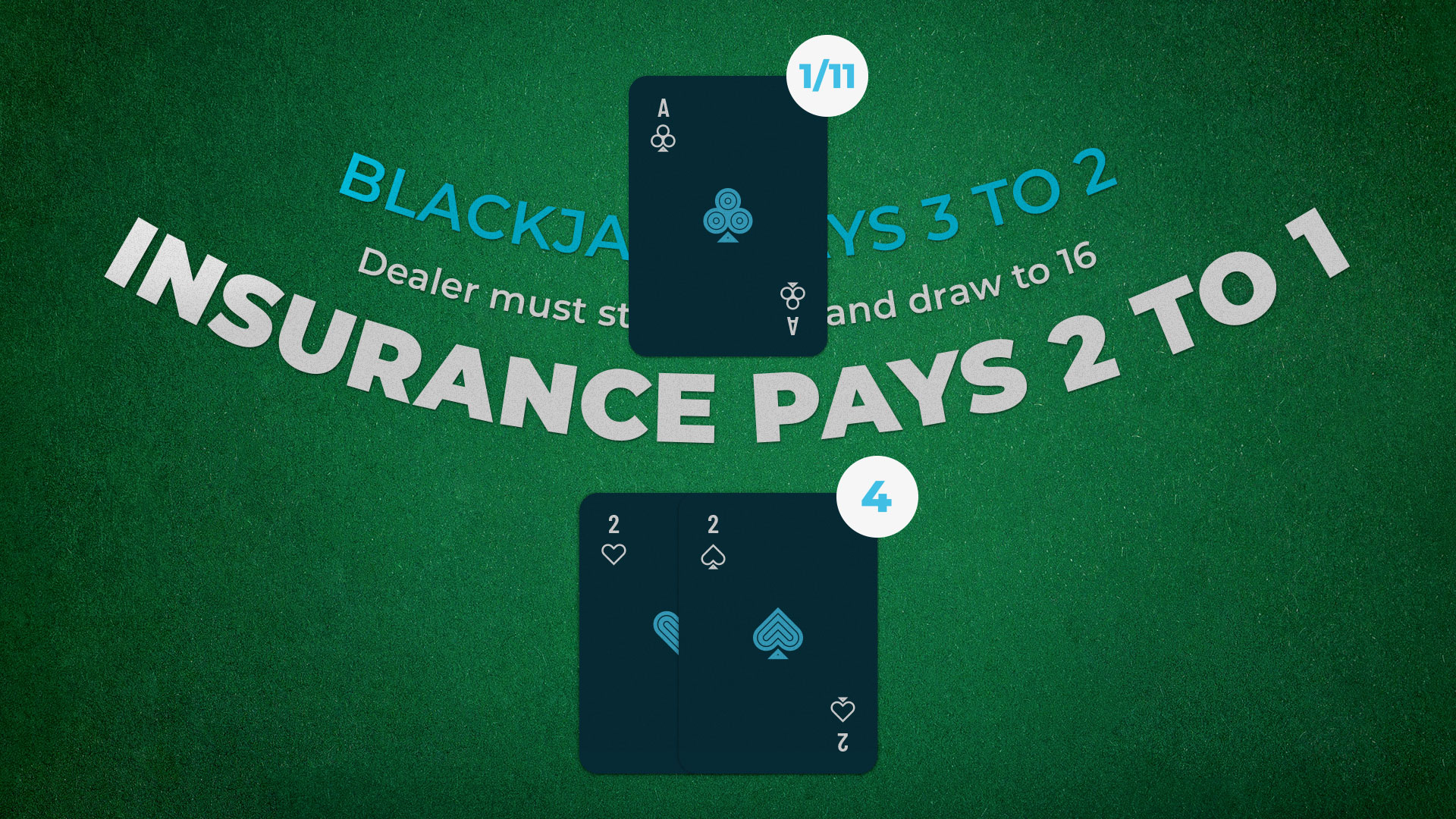
What is blackjack insurance?
Find out everything you need to know about the Insurance bet in blackjack and how you effective it is for players looking to take it. Here's what is covered:
- What is the insurance bet in blackjack?
- When is the best scenario to select insurance?
- Is it worth selecting blackjack insurance?
What is the Insurance Bet in Blackjack?
Blackjack has several side bets, and the insurance bet is one of them.
Basically, an insurance bet in blackjack is a side bet that is designed to protect players from losing their initial bet if the dealer could potentially make a blackjack - and it is offered when the dealer's up card is an Ace.
The cards will be dealt as usual - if the dealer’s visible card is an Ace, all players around the table will be given the option to make an insurance bet. This bet is half of the original stake.

Those who choose to take an insurance bet will place their additional bet in the designated area on the blackjack table, which will usually be demarcated as the insurance spot.
Once all the insurance bets have been made, the dealer's hole card can be checked. If the dealer does indeed have a blackjack (so their face-down card is a 10-value card such as 10, J, Q, or K), then the insurance bet will pay out.
However, if the dealer doesn’t have a natural blackjack, then the insurance bet is lost. In this case, the game will then go on as normal - and you can still win or lose your original bets depending on your own hand's value compared to the dealer’s hand.
The payout for an Insurance bet
If your insurance bet does win, in most games, it pays out at 2 to 1. For example, if you placed a £10 insurance bet and the dealer does have a blackjack, you would get a £20 payout plus your original £10 stake would be returned.
When is the Best Scenario to Select Insurance?
Here are the scenarios where you might look to take insurance and those where you should avoid it.
When to Consider Insurance
Late in the Deck: If you are playing a single-deck game, where most of the cards have already been dealt, and you haven't seen many ten-value cards, the likelihood of the dealer having blackjack is higher than normal - and probability would suggest this is a better time to take insurance.
When to Avoid Insurance
It’s fair to say that there are more scenarios where avoiding this type of bet is the better option:
Basic Strategy: If you are following the basic blackjack strategy - which is based on making the statistically best choices, it usually advises players against taking insurance because the odds of winning such a bet are not great in the long run.
In Most Multi-Deck Games: Ultimately, taking out insurance is almost never a great idea - the odds state that it’s nearly always a bad bet. Logically, there are more low-value cards (2 to 9) in a deck than 10-value cards. So, statistically, there is a much greater chance that the dealer won’t have blackjack. Unless you are playing a single-deck game and know that there are more tens left than small numbers, it’s almost always the better idea to skip the insurance bet.
Is It Worth Selecting Blackjack Insurance?
Ultimately, the odds are against taking an Insurance bet in blackjack, and here are some of the reasons why players would avoid it.
Unfavourable Odds
In most cases, more experienced players tend to avoid taking insurance as the odds are usually not in their favour. This is because the payout for a winning insurance bet is a lot lower than the actual odds of the dealer having a blackjack when showing an Ace - so essentially, it’s not a value bet, and it has a high house edge.
House Edge
In a game with such a low house edge, the house advantage on blackjack insurance bets can be as high as 6% or more, depending on the specific blackjack variation you’re playing and the number of decks in play. Online blackjack has a wide variety of games available to play, so make sure to find out what version you are playing before making any bets.
This means that, on average, you are more likely to lose your bet if you choose insurance every time the dealer shows an Ace.
Basic Strategy
Most blackjack players choose to use the basic blackjack strategy, which is based on statistical analysis - and advises against taking insurance in most situations. Following the basic strategy gives you the best ways in which you should play your hand in any given scenario - and it normally involves declining insurance unless you have reason to believe that there is a higher-than-normal chance that the dealer is likely to have a blackjack.
Bankroll Impact
One important aspect of any casino game is bankroll management and budgeting - and taking insurance can have a big impact on your overall bankroll, especially if you're making large insurance bets.
So - should you take out an insurance bet in blackjack?
Well, the odds and house edge associated with blackjack insurance certainly indicate that it’s probably not the best move to make. It's generally not a long-term strategy and won't apply in all scenarios.
Instead, you’re simply better off focusing on learning the game and knowing the best way to play each hand statistically with the right strategy.